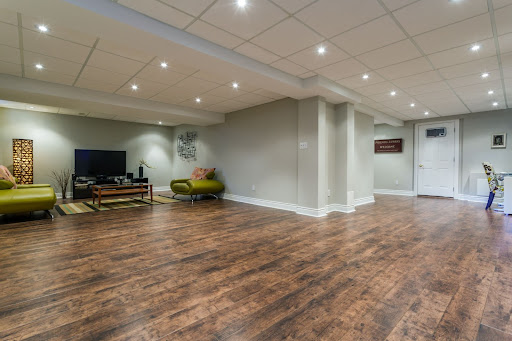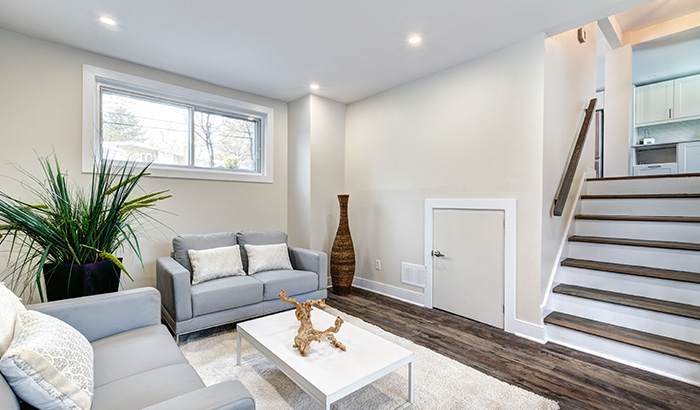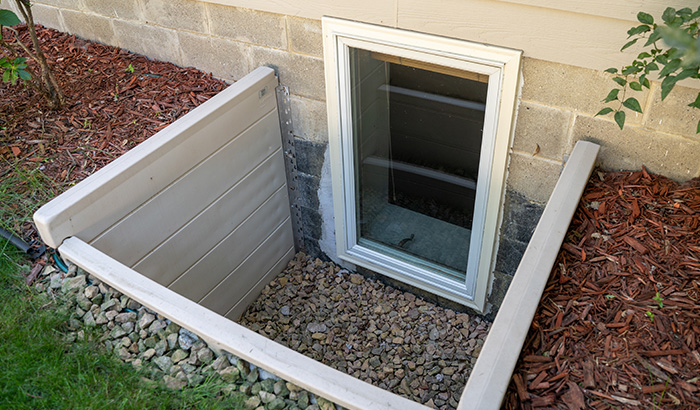Basements have long been valued for their versatility. Many homeowners utilize them for storing items that are not frequently used, such as seasonal decorations, old furniture, or sporting equipment. This storage function helps declutter other areas of the house, providing more living space for everyday activities.
Additionally, basements often serve as recreational spaces. They can be transformed into a cozy family room, a game room, or a place to host gatherings with friends and loved ones. By dedicating the basement to leisure activities, you can create a separate area for entertainment, allowing the rest of the house to remain neat and tidy.
While basements are commonly associated with storage and recreation, their potential as a safety feature is often underestimated. Basements have several lesser-known advantages that can contribute to the overall safety of your home.
- Protection from Natural Disasters:
Having a basement can be a lifesaver when severe weather strikes, such as tornadoes or hurricanes. The underground nature of basements provides a more secure and stable environment during these events.
By seeking shelter in the basement, you can minimize the risks associated with high winds, flying debris, and collapsing structures. It is important to ensure that your basement is adequately prepared for such emergencies, with reinforced walls and sturdy construction.
- Fire Safety Measures:
Fire safety is a crucial aspect of home security, and basements can play a significant role in this regard. Basements are often constructed with fire-resistant materials, which can help prevent fires from spreading to other parts of the house. It is advisable to equip your basement with smoke detectors and fire extinguishers, ensuring early detection and swift response in case of a fire.
- Enhanced Security:
Basements can also contribute to your home’s overall security against intruders. By reinforcing basement doors and windows with sturdy locks, you create an additional barrier that can deter potential burglars. Additionally, installing security systems and cameras in the basement can provide extra protection and help monitor suspicious activity.
- Health and Emergency Preparedness:
Basements offer an opportunity to create a safe and healthy environment within your home. By ensuring proper ventilation and waterproofing systems, you can prevent issues such as mold growth and excessive moisture, which can negatively impact your health. Moreover, utilizing the basement as a storage space for emergency supplies, such as food, water, and first aid kits, can greatly enhance your preparedness for unforeseen events.
Basement as a Shelter during Natural Disasters
When severe weather strikes, such as tornadoes, hurricanes, or strong storms, having a safe and secure place to seek shelter becomes paramount. Your basement can serve as a reliable storm shelter, providing protection and peace of mind during natural disasters. Let’s explore how basements can be utilized as effective shelters and discuss the necessary steps to prepare your basement for these events.
Severe weather events, such as tornadoes and hurricanes, can cause significant damage to homes and pose a serious threat to the safety of individuals. However, basements offer a unique advantage in providing protection against these forces of nature. The underground nature of basements ensures they are less exposed to high winds and flying debris, reducing the risk of injury and structural damage.
Basements are inherently designed to be structurally sturdy, making them ideal spaces to seek shelter during severe weather events. The solid foundation and walls of a basement can withstand the impact of strong winds and debris more effectively than above-ground areas of the house. In the event of a tornado or hurricane, retreating to the basement can significantly increase your chances of remaining safe and unharmed.
To maximize the effectiveness of your basement as a storm shelter, it’s important to consider the following:
- Accessibility: Ensure easy access to the basement by keeping the stairwell clear of clutter and obstruction. Make sure all family members are familiar with the quickest and safest route to the basement in case of an emergency.
- Reinforcement: Reinforce the structural integrity of your basement by installing additional support beams, braces, or other measures as recommended by a professional. Strengthening the walls and foundation can enhance the basement’s ability to withstand strong winds and severe weather conditions.
- Emergency Supplies: Stock your basement with essential emergency supplies, such as flashlights, batteries, a weather radio, blankets, and a first aid kit. Store ample food and water to sustain your family for a few days, as well as any necessary medications.
- Communication: Make sure you have a reliable means of communication in the basement, such as a charged cell phone or a battery-powered radio, to stay updated on weather conditions and emergency information.
To ensure that your basement is adequately prepared for natural disasters, consider the following steps:
- Regular Maintenance: Keep your basement well-maintained by inspecting for any cracks or leaks in the walls, floors, or windows. Repair any damages promptly to prevent water intrusion and maintain the structural integrity of the basement.
- Waterproofing: Invest in waterproofing measures, such as applying sealants to walls and floors or installing a sump pump, to prevent water seepage during heavy rainfall or flooding. Proper waterproofing helps protect your basement and its occupants during natural disasters.
- Emergency Plan: Create an emergency plan with your family that includes clear instructions on what to do in the event of severe weather. Assign specific roles and responsibilities to each family member to ensure a swift and organized response.
- Practice Drills: Regularly conduct drills to familiarize your family with the procedures and protocols to follow during a severe weather event. This practice will help everyone stay calm and react quickly when facing an emergency.
By taking these precautions and preparing your basement as a designated storm shelter, you can provide a safe haven for your family during natural disasters, minimizing the risks and ensuring their well-being.

Fire Safety Measures in the Basement
When it comes to home safety, fire prevention, and preparedness are of utmost importance. Basements, integral to residential buildings, require special attention regarding fire safety.
In this section, we’ll explore the significance of fire safety, discuss fire-resistant construction materials for basements, and highlight the importance of installing smoke detectors and fire extinguishers in this area of your home.
Fires can devastate homes and endanger lives within a matter of minutes. That’s why prioritizing fire safety in residential buildings, including your basement, is crucial. Basements, often used for storage or as utility spaces, can harbor potential fire hazards such as electrical panels, flammable materials, or heating systems. Taking proactive measures to prevent fires and protect your basement can help safeguard your home and loved ones.
One effective way to enhance fire safety in your basement is by incorporating fire-resistant construction materials. These materials are designed to withstand the spread of flames and limit the damage caused by fires. When finishing or renovating your basement, consider the following fire-resistant options:
- Gypsum Board: Gypsum board, commonly known as drywall, is a popular choice for basement walls and ceilings. Opt for a fire-resistant gypsum board specially formulated to provide enhanced fire protection.
- Fire-Rated Doors: Install fire-rated doors leading to and from the basement. These doors are designed to resist the spread of fire, providing additional time for evacuation and minimizing the risk of fire spreading to other parts of the house.
- Fire-Resistant Insulation: Insulating the basement with fire-resistant insulation materials can help prevent the rapid spread of flames. Look for insulation products specifically designed to have fire-retardant properties.
- Fireproof Paint: Consider using fireproof paint on the walls and ceilings of your basement. This type of paint contains fire-resistant additives that can slow the spread of flames and reduce smoke production during a fire.
Smoke detectors and fire extinguishers are essential fire safety devices that should be installed on every level of your home, including the basement. These devices can provide early warning of a fire and allow you to take prompt action to extinguish it or evacuate safely. Here’s what you need to know:
- Smoke Detectors: Install smoke detectors in your basement to detect the presence of smoke or fire. Choose models specifically designed for basements, as they may have features such as enhanced sensitivity to smoke or better resistance to humidity.
- Fire Extinguishers: Keep at least one fire extinguisher in your basement, ideally near the exit. Make sure it is easily accessible and everyone in the household knows how to operate it. Consider using a multi-purpose fire extinguisher that can handle various types of fires, such as those caused by wood, flammable liquids, or electrical equipment.
Remember to regularly test your smoke detectors, replace batteries as needed, and ensure that fire extinguishers are up to date and in proper working condition.
Prioritizing fire safety measures in your basement is crucial for protecting your home and loved ones. Don’t overlook the importance of fire safety in your basement, as it is an essential part of your overall home fire safety plan.
Basement Security Against Intruders
Regarding home security, it’s essential to ensure that all areas of your house, including the basement, are well-protected against potential intruders. Basements, often located below ground level and with less visibility, can be susceptible to unauthorized access if not properly secured.
In this section, we’ll explore effective ways to enhance the security features of your basement, including reinforcing doors and windows and utilizing security systems and cameras.
The first step in securing your basement is to assess the existing security features and identify any vulnerabilities. Consider the following measures to enhance basement security:
- Lighting: Adequate lighting is a powerful deterrent against intruders. Install motion-sensor lights around the perimeter of your house, including the basement entrance. Well-lit areas discourage unwanted activity by increasing visibility and making potential intruders more easily identifiable.
- Fencing and Landscaping: Secure your property with fencing and landscaping restricting access to the basement windows and entrance. Tall fences, thorny bushes, and prickly shrubs can create an additional physical barrier, making it more difficult for intruders to approach the basement discreetly.
- Alarm System: Install a comprehensive alarm system that covers your entire house, including the basement. A professionally monitored security system can provide extra protection, alerting authorities in case of a break-in or suspicious activity.
Basement doors and windows are common entry points for intruders. Reinforcing them is crucial to preventing unauthorized access. Here are some effective methods to fortify these access points:
- Solid Doors: Replace flimsy or hollow basement doors with solid-core doors made of strong materials, such as solid wood or metal. Reinforce the door jambs and hinges, and consider installing a deadbolt lock for added security.
- Window Security Bars: Install security bars or grilles on basement windows to deter potential intruders. These bars can be designed to allow for a quick escape in emergencies while preventing unauthorized entry.
- Security Film: Apply security film to basement windows to make them more resistant to breakage. The film acts as a protective layer, making it difficult for intruders to shatter the glass and gain access to your home.
Modern security systems and cameras are valuable tools in deterring intruders and providing evidence in the event of a break-in. Consider the following options for your basement security:
- Surveillance Cameras: Install surveillance cameras in strategic locations around your property, including the basement entrance. Visible cameras act as a deterrent, while hidden cameras can provide discreet monitoring. Make sure the cameras are connected to a recording system or cloud storage for easy access to footage if needed.
- Motion Sensors: Install motion sensors in the basement that trigger an alarm or alert when movement is detected. These sensors can provide an additional layer of security by detecting unauthorized access and activating the alarm system.
- Home Security Signs: Place home security signs and stickers near the basement entrance and around your property. Even if you don’t have a security system, these signs can create the illusion of security and discourage potential intruders.
Remember to regularly maintain and test your security system, replace batteries as needed, and keep cameras clean and free from obstructions.

Health and Emergency Preparedness in the Basement
Creating a safe and healthy environment in your basement is important for your everyday well-being and crucial in emergencies. In this section, we’ll explore how you can establish a safe and healthy basement environment, store emergency supplies, and ensure proper ventilation and waterproofing for optimal health and emergency preparedness.
- Moisture Control: Moisture in the basement can lead to mold growth and compromise indoor air quality. Take measures to control moisture by using dehumidifiers, promptly addressing water leaks, and ensuring proper drainage around your home’s foundation.
- Radon Mitigation: Radon is a colorless, odorless gas that can seep into basements and pose serious health risks. Consider testing your basement for radon and, if necessary, install a radon mitigation system to reduce radon levels to safe limits.
- Adequate Lighting: A well-lit basement enhances safety and contributes to a healthier environment. Ensure that your basement has sufficient lighting by combining natural light, windows, and artificial lighting sources.
- Proper Insulation: Insulating your basement properly helps regulate temperature, prevents energy loss, and improves overall comfort. Insulate walls, floors, and ceilings with appropriate insulation materials to maintain a comfortable and energy-efficient basement environment.
Your basement can serve as a convenient storage space for emergency supplies, ensuring you are well-prepared in times of crisis. Consider the following when storing emergency supplies:
- Food and Water: Store non-perishable food items and an ample supply of clean drinking water in your basement. Regularly rotate food items and check expiration dates to maintain freshness.
- First Aid Kit: Keep a fully stocked first aid kit in your basement. Include essential items such as bandages, antiseptics, medications, and basic medical supplies. Make sure the kit is easily accessible and everyone in the household knows its location.
- Emergency Tools: Store essential tools in your basement for emergencies, including a flashlight, batteries, a multi-purpose tool, a manual can opener, and a portable radio. These tools can be invaluable during power outages or other emergency scenarios.
- Warmth and Shelter: Include extra blankets, warm clothing, and sleeping bags in your emergency supplies. These items can provide comfort and warmth in case of a prolonged power outage or loss of heating.
Proper ventilation and waterproofing are essential for maintaining a healthy and safe basement environment, especially during emergencies. Consider the following measures:
- Ventilation: Install ventilation systems, such as exhaust fans or dehumidifiers, to improve air circulation and prevent the buildup of moisture, odors, and pollutants. Adequate ventilation helps minimize the risk of mold growth and maintains good indoor air quality.
- Waterproofing: Protect your basement from water intrusion by applying waterproof coatings or sealants to the walls and floors. Consider installing a sump pump to remove excess water and prevent flooding during heavy rainfall or melting snow.
- Drainage Systems: Ensure proper drainage around your home’s foundation to prevent water from seeping into the basement. Clear debris from gutters and downspouts, and ensure they direct water away from your house.
Regularly inspect and maintain your ventilation and waterproofing systems to ensure their effectiveness during emergencies.
A Safe and Secure Basement with Windowell Expressions
When it comes to transforming your basement into a safe and inviting space, Windowell Expressions is a valuable resource. Explore our wide range of products and find the perfect solutions for your basement needs.
With Windowell Expressions, you can enhance your basement’s safety, functionality, and overall appeal, making it a space you and your family can enjoy with peace of mind. Feel free to reach out to us at any time for more information.







